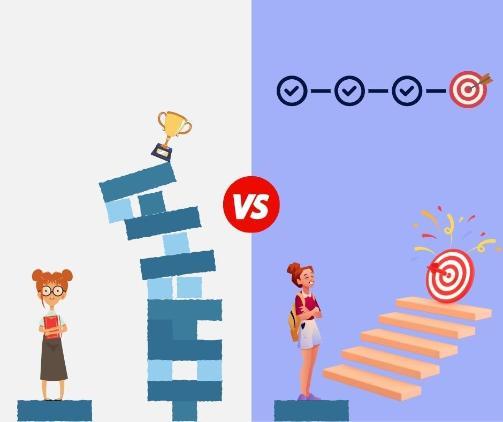What is goal setting?
Goal setting is the process of determining what you would like to achieve and how you intend to achieve it. Some goals may be big and long-term, such as graduating from university, while others may be simpler and short-term, such as submitting an assessment task.
Setting goals helps you manage your responsibilities. Having clear goals will ensure you stay focused and motivated with your assessment preparation and deadlines. Breaking down larger goals into more achievable sub-goals, can also help make larger goals more manageable.
Setting goals
Determine the timeframe for your goal
First consider whether your goal is short-term or long-term. An example of a long-term goal is where you want to be in five years, such as what job you’d like to have when you finish your degree. Short-term goals often help you work towards your long-term goals, such as completing major assessments and/or each subject of your degree with a high average.
Using the SMART goals strategy
There are many strategies and tools to assist in setting goals. A common strategy is the SMART goals strategy, which can assist in setting concrete and achievable goals.
Specific: the goal relates to something identifiable, rather than broad and general.
Example: I will rewatch all of my lectures as part of my exam preparation.
Measurable: the goal can be measured to know if it has been achieved.
Example: I will spend 2 hours studying every afternoon.
Attainable: the goal is realistic and achievable given the constraints of the task.
Example: I will study for 1 hour then take a break for 10 mins.
Realistic: the goal is practical and a good representation of what could be done.
Example: I will aim for 5 marks higher in my exam this year than last year.
Time-bound: a time-frame for achieving the goal is included.
Example: I will rewatch the first six lectures before the end of STUVAC Week.
Create a plan
Once you know what you want your goal to be, you can work through the following process:
- Identify potential obstacles and how to overcome them. Pre-emptively considering what might stop you from completing your goals will allow you to re-adjust them to overcome the issue. An example of an obstacle to graduating by 2026 is the potential for subjects to run in semesters that don’t match your schedule. In this case, you might have to look into Summer session subjects or adjusting your goal of graduating by 2026 to graduating by 2027.
- Create a schedule or timeline to achieve your goals. You can integrate this schedule with your Office365 calendar to ensure you stay on track with your day-to-day tasks. See also Time management and Staying Organised.
- Focus on the present – and how you’re working towards achieving your goal in the now. Try not to focus too much on the lectures or deadlines you’ve missed. Focus on how you can achieve or adjust your goals from now.
- Establish sub-goals to work towards your bigger goal. Breaking down your big goal into smaller, more immediately achievable ‘chunks’ will help you feel less overwhelmed and more on track with your progress.
Outlining realistic and manageable steps you can take to reach the goal will ultimately make it more achievable.

Evaluate your progress
It’s easy to set goals and lay out a plan and forget about it. Check in frequently with your schedule to see how you are tracking and evaluate whether you need to adjust your goals. Some ideas and suggestions for monitoring your progress are:
- Have your goal written down where you can see it.
- Keeping a tally of goals you have completed.
- Have friends, family, or academic mentors check in with you to keep yourself accountable.
- Celebrate when you achieve milestones.


